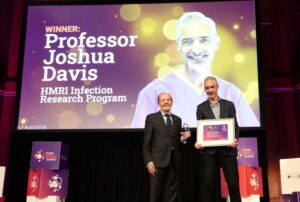
Four researchers from The George Institute for Global Health have been awarded prestigious Heart Foundation grants for their groundbreaking projects aimed at combating cardiovascular disease—Australia’s leading cause of death, responsible for approximately 17,000 deaths each year. These innovative studies, which range from national food policy reform to rapid stroke diagnosis and heart failure prevention, hold the potential to revolutionize the prevention, diagnosis, and treatment of heart disease.
Legal Reforms for a Healthier Food Environment
Associate Professor Alexandra Jones is leveraging her expertise in law to create a healthier food environment. Supported by a Future Leader Fellowship, her four-year project will explore how legal reforms could help reduce diet-related heart disease in Australia. The research focuses on two key strategies: mandating Health Star Ratings on all packaged foods and setting legal limits on salt and sugar in select products. This approach has already shown promise in countries like South Africa and Argentina.
Since the voluntary adoption of the Health Star system in 2014, uptake has been particularly low among less healthy products. Poor diets remain a major driver of heart disease, and many Australians, especially those facing economic disadvantages, struggle to meet healthy eating guidelines. Highly processed foods continue to be more affordable, widely available, and heavily marketed.
Jones’s study builds on extensive collaboration with government and public health groups, aiming to inform the development of stronger legal measures that foster a food environment conducive to healthier choices.
Innovative Approaches to Heart Failure Prevention
Dr. Angela Xun-Nan Chen is investigating whether diabetes medications can prevent heart failure before it begins. Her international pilot study, supported by a Postdoctoral Fellowship, will examine the efficacy of SGLT2 inhibitors—a class of diabetes drugs proven to reduce hospitalizations and deaths in heart failure patients—in preventing heart failure in high-risk individuals.
Heart failure affects 480,000 Australians, with only about half surviving more than five years post-diagnosis. The study will enroll over 400 participants across six countries to assess the drug’s safety, adherence, and feasibility in preventing heart failure. Success in this pilot could lead to larger trials and new strategies for preventing this costly and debilitating chronic disease.
Exploring Heart Fat’s Role in Heart Failure Recovery
Doctoral researcher Shaun Khanna is delving into the role of epicardial adipose tissue (EAT)—a type of fat surrounding the heart that can release inflammatory substances affecting heart function—in heart failure patients with reduced ejection fraction (HFrEF). Supported by a Postgraduate Scholarship, this study seeks to clarify whether varying levels of EAT are harmful and how this fat changes over time or responds to treatment.
Using advanced cardiac CT scans, researchers will compare heart fat levels across different groups and follow heart failure patients for 12 months to determine if changes in EAT predict recovery or treatment response. The findings could lead to more personalized treatment and alter how heart failure is monitored and managed in clinical practice.
Rapid Stroke Diagnosis with a Simple Blood Test
Associate Professor Cheryl Carcel and her team are addressing delayed stroke diagnosis with a 15-minute blood test. Supported by a Vanguard Grant, this study investigates how a simple blood test could enable paramedics to rapidly detect bleeding stroke (intracerebral hemorrhage, or ICH) in the field. ICH accounts for 15% of strokes in Australia and is associated with disproportionately high rates of death and long-term disability.
The portable test detects GFAP, a protein that appears in the blood shortly after a brain bleed, requiring only a drop of blood and delivering results in under 15 minutes. This test could allow for faster, more targeted intervention before a patient arrives at the hospital, potentially reducing the risk of death and long-term disability for ICH patients.
The announcement of these grants comes as cardiovascular disease continues to pose a significant public health challenge in Australia. With these innovative projects, the researchers at The George Institute for Global Health are at the forefront of efforts to transform heart disease prevention and treatment, offering hope for improved outcomes and healthier futures.





